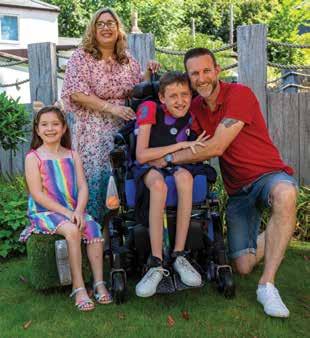
3 minute read
Our cover star Ted
TED’S SMILE
Advertisement

ONE IN 150
Twelve-year-old Ted was born with a rare and terminal condition called Aromatic Amino Acid Decarboxylase Deficiency (AADCd). He’s one of only five children in the UK to have it and there’s only around 150 children with the condition worldwide.
“Ted’s neuro transmitters don’t work in the same way as ours, so from birth he wasn’t able to produce dopamine or serotonin, which are vital for everyday living,” says Zoe. “For the first 10 years of his life, he’d have fits that could last up to 10 hours a day.
“He’s also got scoliosis, which has caused his spine to curve so severely over time that eventually his lungs would be crushed. His ribs were rubbing on his pelvis, so he’s already had his hip joint replaced. He asks to put his cast on every day now because he knows he slumps without it. We talk to Ted about everything and unfortunately in some ways he does understand it all. NOTHING LIKE A HOSPICE “My mum died in a hospice due to cancer, so when a hospice was first suggested to us for Ted, we thought the worst and found that really hard as a family,” says Zoe. “But we couldn’t have been more wrong – Julia’s House has had such a positive impact on all of us, and especially Ted.
“It’s exhausting caring 24/7 for a child who is acutely disabled. So when the nurses and carers from Julia’s House come in and take over for a few hours, it literally lightens everybody’s day up. It means I can go for a walk with my six-year-old or bowling with my 18-year-old, and I don’t have to worry about Ted because I know he’s happy and safe.
“And when the carers come into our home for community sits, Ted’s little sister Emmie will sometimes
Ted with mum Zoe, dad Sven and sister Emilia join in the fun too – for example making pancakes on Pancake Day. It’s nice because with those extra pairs of hands you can do something memorable together like that. SOMEWHERE TO BELONG “I think everyone’s mental health has been hit hard during the pandemic, but pressures build up over years when you have a disabled child. Sven and I both work as well as caring for Ted and our two other children, and we can be incredibly exhausted from week to week. I don’t know how we would have survived lockdown without Julia’s House coming in. And it made such a difference for Ted’s mental health to have that social interaction from the carers. When the pandemic hit, most of our other care seemed to stop overnight, but Julia’s House has been there with us throughout it all. “Without Julia’s House it would just go back to how it was before – Sven and I wouldn’t have date nights, or this respite. We wouldn’t have that quality time with each other and Ted’s siblings. Also Ted wouldn’t have that independence either. He doesn’t get invited to parties or go to other people’s houses like his siblings do. When he goes to the hospice, it’s like his own special place. That’s huge for a 12-year-old boy – to feel like you have somewhere to belong.”







